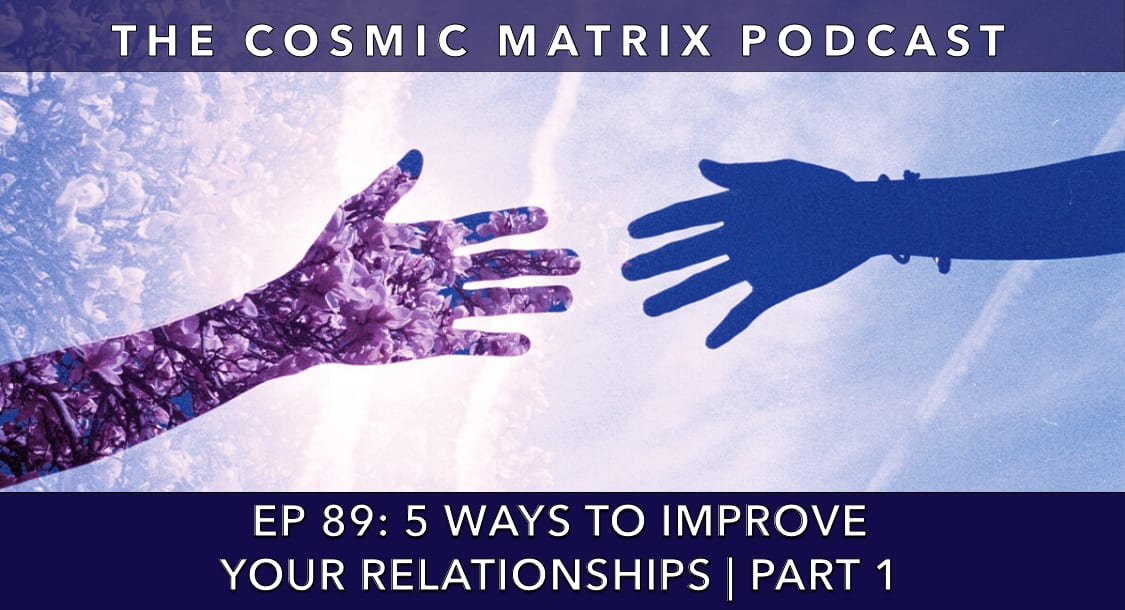Podcast: Play in new window | Download (Duration: 52:53 — 30.3MB) | Embed
Subscribe: Apple Podcasts | Spotify | Android | RSS | More
Relationships have become more challenging for many people. In this episode, Bernhard and Laura share five fundamental ways to improve all your relationships. They discuss the necessity for Animus/Anima integration, how healing from developmental trauma is key to healthy relationships, and the biologically-based core needs that are essential to our physical and emotional well-being to thrive in life and relationships. Furthermore, they provide practical tips and reflective questions to help you create and attract better relationships.
Show Notes Part 1:
- Learning the art of listening and communication skills
- The trap of overly isolating yourself and denial of the need for a relationship
- 3 parts to work on: each individual on themselves and the relationship
- There’s a difference between unfulfilled childhood needs we try to get met from our partner as opposed to healthy adult needs
- Attachment styles, self-awareness
- Differentiation, vulnerability, taking responsibility
- The 5 A’s – and how this teaches you how to be more mature in relationships
- Attention/acceptance/appreciation/affection/allowing – begin as needs to be fulfilled by our parents and then become needs fulfilled by our partners and become gifts we give to others in the world
- Attention = attunement. We cannot attune if we assume certain feelings; we need to be neutral and mindful; it requires genuine interest and curiosity.
- Don’t be furious; be curious
- Acceptance: you’re embraced as worthy, and you approve and validate the person – not trying to change your partner in something you want. It validates someone even if you do not agree.
- Appreciation: gives depth to acceptance; you admire, respect, and appreciate the person as unique. We need this for self-worth and confidence. Appreciation and gratitude go hand in hand – daily double
- The ratio of appreciation to a complaint in couples that stay together is 5 -1
- Beneath every complaint is a lack of the 5 A’s
- Affection is loving touch, physical touch, and embrace. Compassion is a form of affection
- Allowing: allowing the other person to be themselves, non-controlling
In Part 2 (only for members) we go deeper into:
- Anima/Animus projections and how it determines who we attract and are attracted to
- The alchemical marriage of the inner male and female
- The four stages of Anima/Animus projections and integration
- Developmental Trauma and how it affects our relationships
- Type 1 single-incident traumas, what we refer to as shock trauma
- Type 2 prolonged, interpersonal traumas, what we refer to as complex trauma C-PTSD
- Complex trauma results from chronic, long-term exposure to relational and emotional trauma in which an individual has little or no control
- Relational and emotional trauma leads to profound changes in neurological development and functioning, which causes significant problems in a person’s life
- C-PTSD is being used as a catch-all for both ongoing interpersonal trauma for children and adults and the impacts of childhood trauma on adults
- Relational Model™(NARM) recognizes five biologically based core needs that are essential to our physical and emotional well-being: the need for connection, attunement, trust, autonomy, and love-sexuality
- These patterns of survival adaptation were created as a way to resolve the core dilemma. They are based on a foreclosing of one’s authentic Self to protect against attachment loss, which is experienced as the loss of love in the universe.
- When a child’s needs and feelings threaten their caregivers and environment, the only choice is to disconnect from core aspects of the Self.
- The adaptive survival styles shape the way children – and later adults – organize, filter, and respond to their life experience
- Shame-based Identification
- The capacity of our connection with another depends on the depth of connection we are capable of within ourselves.
- Reflective questions and practical tips
Go HERE to listen to Part 2 if you’re a member or REGISTER to become a member to have access to the membership section (including the membership forum.)
[Intro and outro music clip by Seeded Vision]







